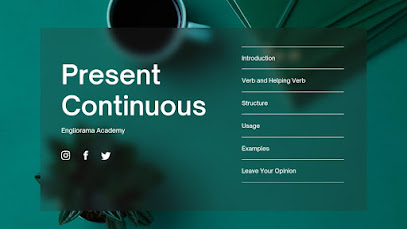What is Present Continuous and its uses? Explained with Examples
The present continuous tense is used to describe an action
that is currently in progress or happening at the moment of speaking. It is
used to talk about temporary actions or events that are happening now.
The structure of the present continuous tense is:
1)
Simple: Subject + Helping Verb + Verb +
Object
2)
Negative: Subject + Helping Verb + not + Verb
+ Object
3)
Interrogative: Helping Verb + Subject + Verb +
Object
4) Negative Interrogative: Helping Verb + Subject + not + Verb + Object
For example:
- I am working on my project.
- She is studying for her exams.
- They are playing a game.
Note that the verb "to be" is always conjugated in
the present tense (am/is/are), while the main verb is in the present participle
form (ending in -ing).
The present continuous tense is often used with time
expressions such as "now," "at the moment," or "right
now" to emphasize that the action is happening at the present time.
There are several uses of the present continuous tense:
1. To describe an action that is in progress at the moment of
speaking:
For Example:
- I am writing an email.
- She is cooking dinner.
- They are watching a movie.
2. To describe a temporary action or event that is happening
now:
For Example:
- I am living in a different city for the summer.
- She is studying abroad this semester.
- They are on vacation until next week.
3. To describe an action that is planned or arranged for the
near future:
For Example:
- I am meeting my friends for lunch tomorrow.
- She is going to the movies tonight.
- They are flying to Paris next month.
4. To describe a repeated or ongoing action that is annoying or
frustrating:
For Example:
- I am always forgetting my keys.
- She is constantly losing her phone.
- They are forever making a mess.
5. To describe a change that is happening or will happen in the
future:
For Example:
- The weather is getting colder.
- He is becoming more and more successful.
- The economy is improving.
It is important to note that the present continuous tense is
not used to describe permanent or long-term actions or states. For these types
of actions or states, we use the present simple tense.
For example:
- I live in New York. (permanent action)
- She works at a hospital. (permanent action)
- They are American. (permanent state)
I hope this helps! Let me know if you have any other
questions

